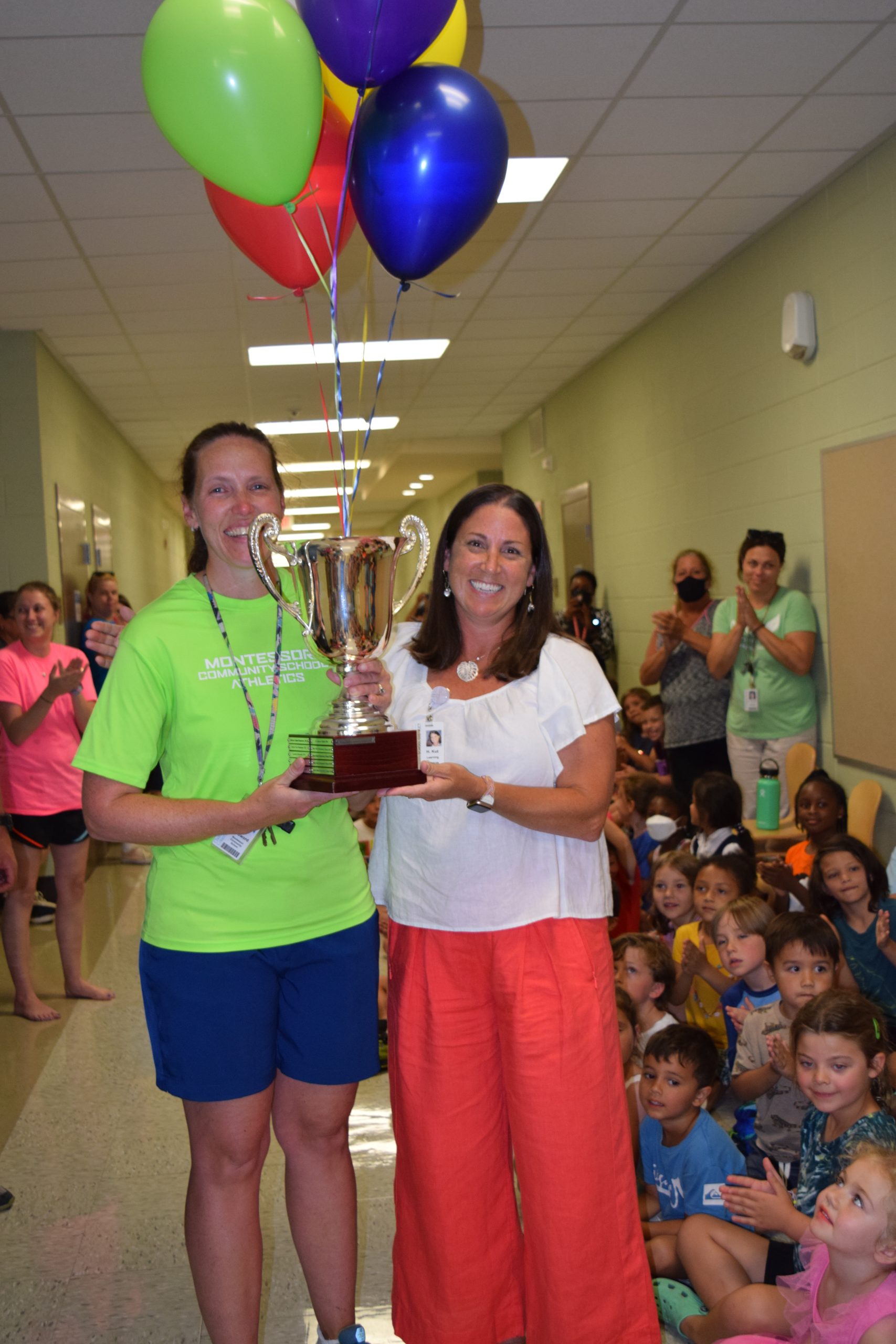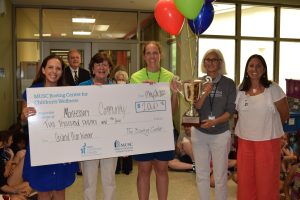Montessori Community wins district’s annual wellness award
June 6, 2022Charleston, SC – The MUSC Boeing Center for Children’s Wellness (BCCW) in partnership with Charleston County School District (CCSD), celebrated schools and their wellness efforts last month.
During the 2021-2022 school year, 39 CCSD schools earned a Wellness Award. The grand prize winner was Montessori Community School (MCS). As part of the grand prize, the entire staff at Montessori Community was treated to a healthy catered lunch, presented with a giant check for $2,000, and a trophy.
This was the first time a CCSD Montessori school earned the top award. Physical Education teacher Ruth Sword championed the effort at her school, with the support of the entire faculty and staff. Sword has been at Montessori community for 12 years and said that wellness has always been a part of the culture of the school.
“The Montessori Community School established a culture of wellness throughout their 2021-2022 school year,” said Sword. “All MCS students participated weekly in our school gardening program. MCS students have had the opportunity to attend field trips to local farms to learn about fruits and vegetables. As our MCS students get the opportunity to taste what they have grown, they are open to exploring these new healthy food options.”
Sword explained that physical activity at MCS is also encouraged by participating in the South Carolina Walk to School day, physical activity breaks throughout the week, flexible seating in the classrooms, the MCS Color Fun Run, staff/student volleyball matches, and the Kids Heart Challenge.
Runners up in the BCCW challenge were Harborview Elementary School (led by wellness Leader Heather Hord) and James Island Elementary School (led by wellness Leaders Meredith Barnette and Ginny Jones).
The MUSC BCCW School-Based Wellness Initiative was created with the goal of improving nutrition and increasing physical activity for students and staff by motivating districts and schools to make policy, system, and environmental changes through participation in the School Wellness Checklist.

“It’s been a challenging year for schools, staff, and students, yet we’ve seen school wellness committees really commit to the initiative and thrive,” said Angela Wicke Program Coordinator for MUSC Boeing Center for Children’s Wellness. “We are seeing a trend in relating social-emotional learning with school gardening, yoga, mindfulness, art, and even STEM projects. It’s really exciting to see all of the creative ways that schools are creating cultures of wellness through a concentrated committment to this wellness initiative.”
Wellness Awards range from $250 to $2,000. The award money must go into the wellness programs at each school to help grow and sustain their initiatives. In total, $21,950 went to CCSD schools for the 2021-2022 school year. In addition, CCSD schools received over $32,000 in wellness grants this year to fund initiatives such as school gardens, increased water consumption, kinesthetic classrooms, and movement throughout the school day.
“Participating in the MUSC BCCW School-Based Wellness Initiative is key to developing the whole school, whole community, whole child model (CDC’s framework for addressing health in schools),” said Holly Kut, CCSD Instructional Specialist for Health and Physical Education. “The School Wellness Checklist goes beyond the student health and wellness; it caters to employee wellness, which fosters higher morale, provides self-care opportunities, and community involvement supporting lifelong healthy learning. Happy healthy schools make happy healthy students.”
According to Dr. Janice Key, Director of the MUSC BCCW, all participating schools did an outstanding job supporting wellness through healthy nutrition, adequate physical activity, and support of emotional needs.
“Healthy kids are better learners,” said Key. “Studies have proven that healthier children miss fewer days, have improved behavior, and are more likely to graduate from high school. I am incredibly proud of the efforts made by the students and staff at Montessori Community.”
“We are proud to implement this initiative across the state in 19 school districts,” said Wicke. “CCSD is always a top performer and one oflongest-standingnding districts. Many of the CCSD schools have been participating for so long, that the culture of wellness is now ingrained in their daily operation, resulting in healthier students, staff, and communities.”
“As the physical education teacher and wellness coordinator at MCS, my goal is to create a love of physical activity and healthy eating through exposure to many different ways for my students to build a healthy foundation,” added Sword. “As this healthy foundation is established, students are mentally and physically stronger individuals that are able to be productive citizens in our society.”
For more information, contact the Division of Strategy and Communications at (843) 937-6303.
About the Charleston County School District
Charleston County School District (CCSD) is a nationally accredited school district committed to providing equitable and quality educational opportunities for all of its students. CCSD is the second-largest school system in South Carolina and represents a unique blend of urban, suburban, and rural schools spanning 1,300 square miles along the coast. CCSD serves approximately 49,000 students in 88 schools and specialized programs.
CCSD offers a diverse, expanding portfolio of options and specialized programs, delivered through neighborhood, magnet, IB (international baccalaureate), Montessori, and charter schools. Options include programs in science, technology, engineering, and mathematics (STEM), music and other creative and performing arts, career and technical preparation programs, and military.














